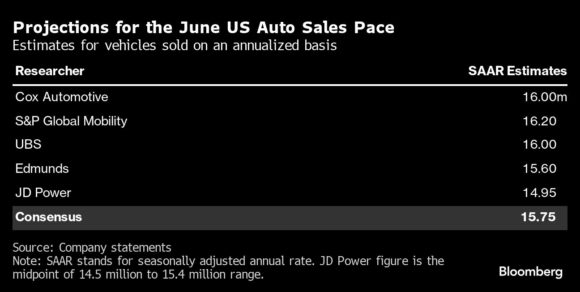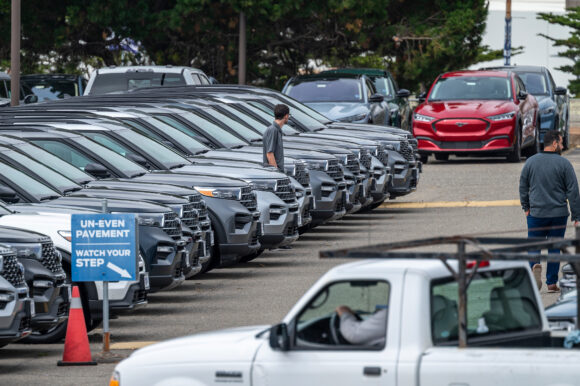The rebound in US auto sales likely lost momentum last month as high prices, steep borrowing costs and cyberattacks that hobbled dealerships across the country weighed on deliveries.
Vehicle sales will probably slow to an annualized rate of around 15.8 million vehicles in June, based on a consensus of five market researchers, down from 16.1 million a year ago. Some analysts see the pace of sales holding steady, as shoppers have returned to showrooms since the Covid-19 pandemic disrupted supply chains and caused an inventory shortage.
Affordability has been the biggest hurdle for consumers, driven by higher interest rates. The average annual percentage rate on a new-car loan has risen to 10%, up 1 percentage point over the past year. Automakers have started discounting more to lure buyers, but many are waiting to see if prices drop further.
Overall pricing is still above 2020 levels, according to Erin Keating, executive analyst with Cox Automotive. That, paired with expectations for further price decline, is “quite the recipe for a market that lacks urgency with little incentive to buy right now,” she said.
 Sales are unlikely drop in the second half, but will remain flat as consumers wait out discounts and any indications that the November presidential election will impact interest rates, Keating said.
Sales are unlikely drop in the second half, but will remain flat as consumers wait out discounts and any indications that the November presidential election will impact interest rates, Keating said.
The hack of software provider CDK Global shut down the company’s systems on June 19, forcing thousands of dealers in the US to temporarily halt sales and then use manual options. The company told dealers this week that it expected to have their systems back up by July 4.
Some purchases may have been pushed into the third quarter, said Jessica Caldwell, the head of insights at researcher Edmunds.
“This event is another speed bump on the automotive industry’s long road to recovery,” Caldwell said. “The good news is — unlike other black swan events that the industry has contended with in the past — sales shouldn’t be lost or severely deferred.”
Top photo: Customers at a Ford dealership in Colma, California. Photographer: David Paul Morris/Bloomberg.
Was this article valuable?
Here are more articles you may enjoy.


 Why 2026 Is The Tipping Point for The Evolving Role of AI in Law and Claims
Why 2026 Is The Tipping Point for The Evolving Role of AI in Law and Claims  Tesla Sued Over Crash That Trapped, Killed Massachusetts Driver
Tesla Sued Over Crash That Trapped, Killed Massachusetts Driver  One out of 10 Cars Sold in Europe Is Now Made by a Chinese Brand
One out of 10 Cars Sold in Europe Is Now Made by a Chinese Brand  Credit Suisse Nazi Probe Reveals Fresh SS Ties, Senator Says
Credit Suisse Nazi Probe Reveals Fresh SS Ties, Senator Says 